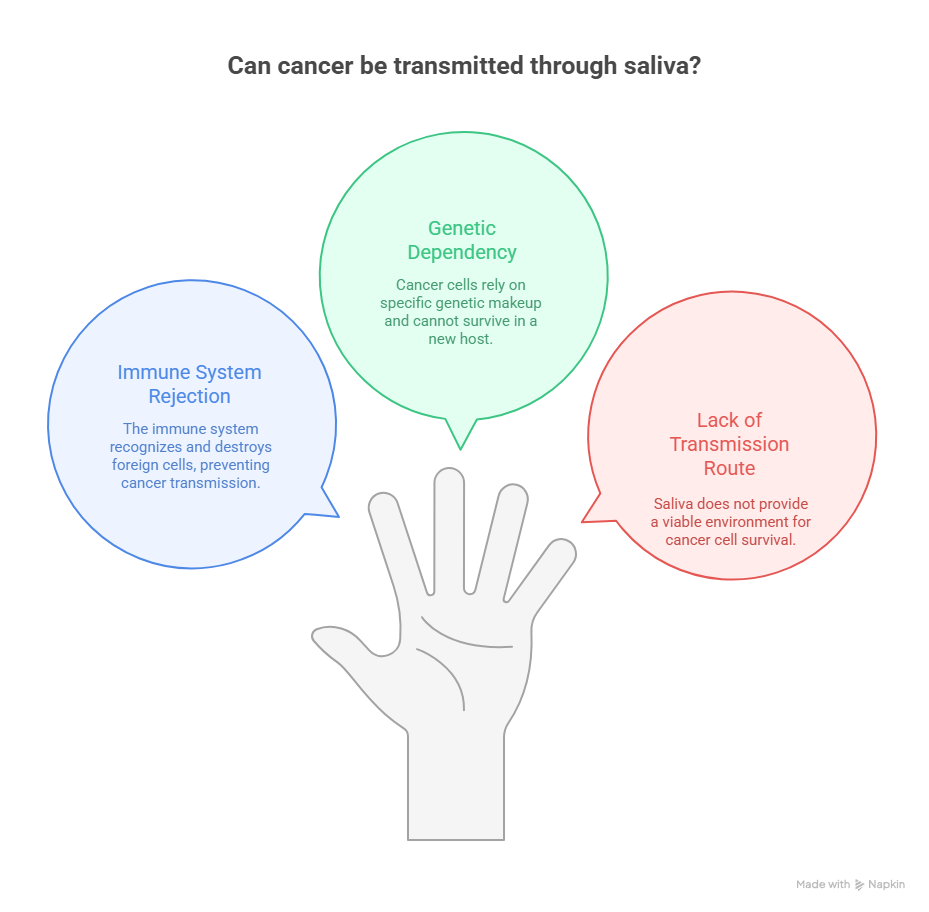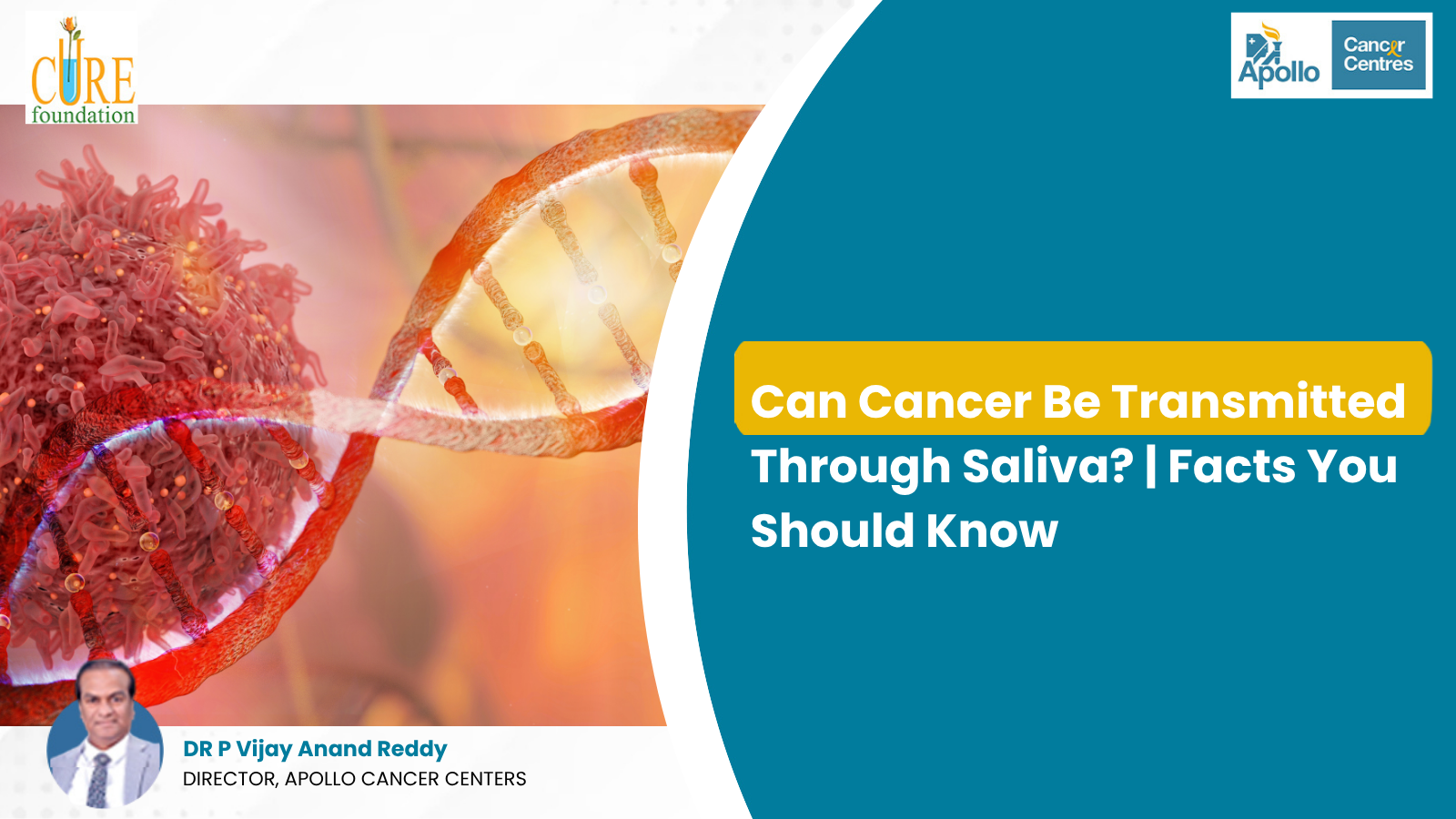That’s an incredibly important and sensitive question. When a loved one is diagnosed with cancer, anxiety often leads to questions about safety and contagion, especially regarding close contact.
Let me give you the direct, medically certain answer right away: Cancer is NOT contagious and cannot be transmitted through saliva. You absolutely cannot “catch” cancer from someone by kissing, sharing utensils, or any other form of casual physical contact.
The central reason that answers the question, Can Cancer Be Transmitted Through Saliva, so definitively is that cancer is a disease of your own cells, caused by your own genetic mutations. A cancer cell from one person cannot survive or grow in another person’s body.
This guide will provide you with the facts you should know, separating the myth from the biological reality and clarifying the subtle role of viruses that are sometimes confused with cancer transmission.
The Fundamental Biological Barrier

To understand why the answer to Can Cancer Be Transmitted Through Saliva is a resounding “No,” we must look at the body’s natural defense systems.
1. Immune System Rejection: The Body’s Security Guard
Your immune system is programmed to recognize and destroy anything foreign that enters your body. This is why you don’t “catch” a cancer.
- MHC Markers: Every cell in your body carries a unique identity tag called the Major Histocompatibility Complex (MHC). When a foreign cell—like a bacteria, a virus, or even a cancer cell from another person—enters your body, your immune system recognizes the foreign MHC markers and instantly mounts an attack to destroy it.
- Cancer Cells Are Foreign: Cancer cells from a donor would be treated as any other foreign transplant, resulting in immediate and total immune rejection before they could ever take hold and proliferate. They simply cannot bypass this defense mechanism to establish a tumor.
2. Genetic Dependency
Cancer cells are intimately tied to the specific genetic makeup of the person in whom they originated. They rely on the precise signaling pathways, hormones, and supporting cells of their original host. They lack the biological machinery or infectious nature of a pathogen (like a virus or bacteria) needed to survive and replicate independently in a new, genetically different host.
3. The Lack of Transmission Route
Unlike viruses, cancer cells do not possess a viable route for transmission from person to person. Saliva, though it may contain shed oral cancer cells in rare cases of advanced disease, does not provide a conducive environment for cell survival, let alone colonization, in the recipient. Therefore, close contact—including kissing, hugging, and sharing drinks—is entirely safe.
The Virus Exception: The Source of Confusion
While the cancer itself is not contagious, certain viruses that can be transmitted through saliva or other means are known to significantly increase the risk of developing cancer years or decades later. This distinction is the main source of the public confusion about whether cancer is transmissible.
It is the virus that is contagious, not the resulting cancer.
| Contagious Virus | Transmission Route | Associated Cancers (Increased Risk) |
| Epstein-Barr Virus (EBV) | Saliva (often called “the kissing disease”), sharing utensils. | Nasopharyngeal cancer, Hodgkin and non-Hodgkin lymphoma. |
| Human Papillomavirus (HPV) | Oral sexual contact, skin-to-skin contact (less common in saliva). | Oropharyngeal (throat) cancer, cervical, anal, and penile cancers. |
Key Fact: Contracting one of these viruses does not guarantee cancer development. It merely introduces a risk factor that, when combined with other factors (like smoking, genetics, or a suppressed immune system), can cause the necessary genetic mutations for cancer to form.
Rare Instances Where Transmission Can Occur
To be absolutely scientifically complete, there are extremely rare, non-casual exceptions that prove the rule of immune rejection:
- Organ or Tissue Transplants: In rare instances (less than $0.05\%$), if a person receives an organ from a donor who had undiagnosed cancer, the cancer cells may take hold. This happens because the recipient is given powerful immunosuppressive drugs to stop their body from rejecting the organ. These drugs also prevent the immune system from destroying the foreign cancer cells.
- Mother to Fetus: In incredibly rare cases, malignant melanoma or leukemia can pass from the mother to the fetus through the placenta. The number of documented cases is minuscule, again highlighting that cancer is not an infectious disease.
The Role of the Breast Oncologist in India and Global Expertise
When anxiety about cancer transmission or risk arises, the best course of action is to consult with an expert who can clarify the biology and focus on true risk factors. Seeking a specialist who is among the Best Oncologist in India ensures access to globally recognized expertise and counseling.
A specialist in advanced oncology, like Dr. Vijay Anand Reddy, doesn’t just treat the disease; they manage the entire patient experience, addressing fears and misinformation. Dr. Vijay Anand Reddy is a highly esteemed expert, particularly in complex radiation oncology and systemic cancer management, who understands the patient’s need for clarity regarding their health risks and prognosis. The expertise of a Best Oncologist in India provides the factual foundation needed to overcome the stigma and fear associated with a cancer diagnosis, reinforcing that the disease is not contagious. Dr. Vijay Anand Reddy’s commitment to scientific rigor and compassionate patient care is essential in separating public fear from medical reality.
Conclusion
This widespread fear, often leading to unnecessary social isolation of patients, is a myth. Cancer cells are foreign to a healthy person’s body and are effectively destroyed by the recipient’s immune system. You cannot ‘catch’ cancer through kissing, sharing food, or other casual contact.
However, we must differentiate this from the transmission of certain viruses, such as Human Papillomavirus (HPV) or Epstein-Barr Virus (EBV), which can be spread through saliva or close contact. We may significantly increase a person’s risk for developing certain types of cancer (like oropharyngeal cancer) years later. Therefore, while the cancer is not transferable, preventive steps like HPV vaccination and maintaining a healthy lifestyle remain crucial. It is vital for us, as a community, to support our loved ones with cancer without fear, understanding that their disease is a personal health battle, not a contagious threat.”
Frequently Asked Questions (FAQs):
Q1: Can I get cancer from sharing a drink or sharing food?
No. You cannot get cancer by sharing drinks, food, utensils, or even cigarettes. Cancer cells cannot survive the journey through the air, food, or digestive tract and cannot colonize a new body.
Q2: What is the highest risk of cancer transmission in a domestic setting?
The highest risk is shared environmental exposure to proven carcinogens, not transmission. This includes secondhand smoke, radon gas, or shared inherited genetic mutations (e.g., BRCA mutations).
Q3: Why do some spouses get the same cancer?
Suppose a husband and wife both develop, for example, oral or lung cancer. In that case, it is usually due to shared lifestyle risk factors (like tobacco use, excessive alcohol consumption, or co-exposure to a contagious cancer-linked virus like HPV) over a long period, not transmission of the cancer itself.
Q4: Does being around a cancer patient weaken my immune system?
No. Being around a cancer patient poses no threat to your immune system. In fact, due to the effects of chemotherapy and radiation, the patient often has a weakened immune system, meaning they are more susceptible to catching common colds or flu from you.
Q5: Should I get vaccinated against cancer-linked viruses?
Yes. Vaccination against viruses like HPV (Human Papillomavirus) is a highly effective, proactive form of cancer prevention. The HPV vaccine prevents infection by the strains most likely to cause cervical, anal, vulvar, and oropharyngeal cancers.

